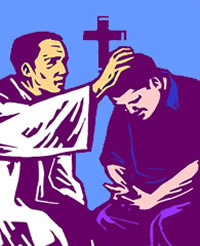
7th Sunday in Ordinary Time Year B
The gospel readings of the last two Sundays have made us aware that Mark is concerned to bring home to his readers that Jesus was far more than a miracle worker. This concern is reemphasised in his account of the healing of the paralytic in today’s reading.
Once again, we have a narrative with vivid circumstantial details, that may well echo the recollections of Peter. The crowds around the door and inside the house made it impossible for the paralytic’s friends to bring him to Jesus. They carry him up to the roof of the house – a construction of loose beams, thatch and mud – and, making a hole, they lower the sick man into the house on his sleeping mat (the bed of the poor). It has been suggested that the ‘four men’ who did this were the original disciples of Jesus, Peter, Andrew, James and John. This would certainly help explain the liberty they took with the roof of Peter’s house.
In this narrative, Mark introduces and emphasises the theme of ‘faith’. Jesus responds to the ‘faith’ shown by the group who have gone to such lengths for their friend. This ‘faith’, so often commended by Jesus, is essentially linked with his message of the coming of God’s Kingdom – a trusting openness to the workings of God. Mark had introduced his narrative by noting that Jesus ministered to the crowd who had been attracted by news of his return to Capernaum, by ‘preaching the word to them’.
In this account, Mark takes up another obstacle faced by Jesus. If the common people were in danger of being carried away by a superficial enthusiasm, the ‘scribes’, those who were experts in the interpretation of the traditions of old Israel, were to have great difficulty accepting the message of Jesus – that the era of expectation and foreshadowing was now to give way (in the mission of the Saviour) to the era of God’s definitive blessings.. This obstacle, we know, was ultimately to lead to the tragic outcome of the earthly ministry of Jesus. Clearly, this was an issue that had to be dealt with in the first apostolic teaching. This preoccupation is reflected in the fact that Mark, with this confrontation, begins a series of five ‘conflict stories’, in which the determined opposition Jesus was to meet is described. Often repeated, these stories have assumed a fairly stereotype form. They all come to a climax with a pronouncement of Jesus that silences his opponents. Because, in their understanding of the Law only God can forgive sin, the scribes accuse Jesus of blasphemy. We would be reading too much into the response of Jesus, if we saw Mark as recording at this stage in his story an unambiguous claim to divinity. The ‘Son of Man’ theme is ambiguous. It can be a simple affirmation of someone’s humanness. In the Book of Daniel, however, it refers to God’s eschatological people exercising authority, in the Lord’s name. The trial of Jesus (cf. Mk 14:62) made it clear that Jesus did lay claim to this title. Probably, at this point in Mark’s gospel Jesus is making a claim that he acts with divine authority. Describing the astonishment of the people, Mark reminds us of his subtext: Who is this man?
John Thornhill sm

